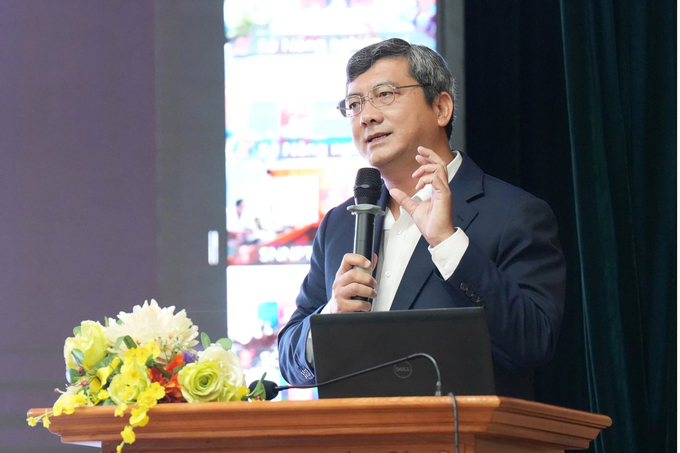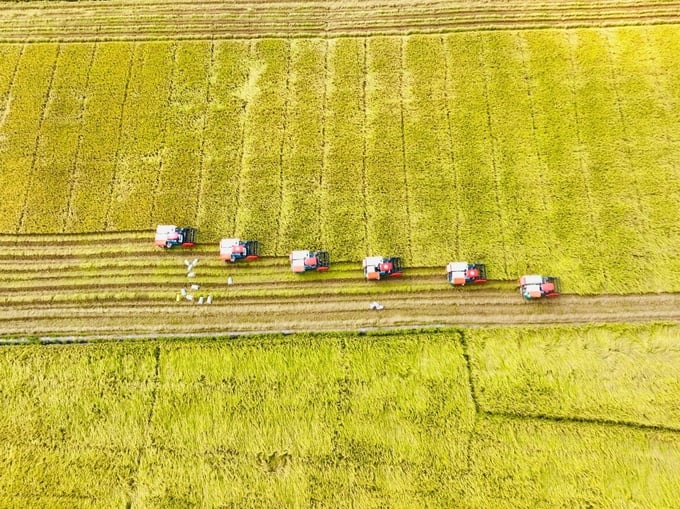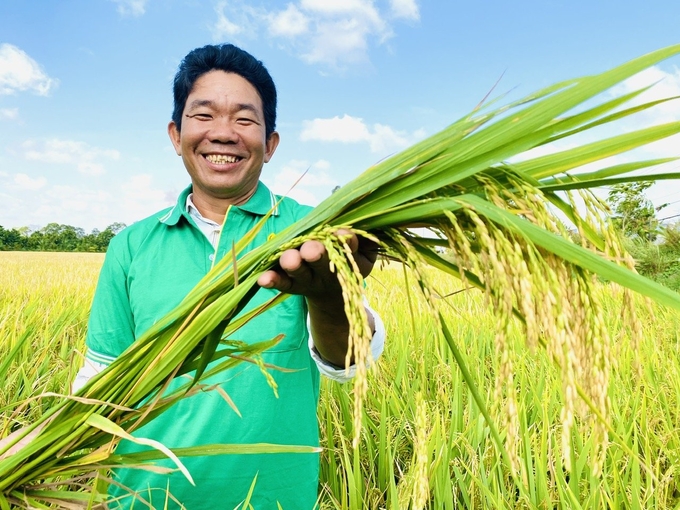June 16, 2025 | 22:10 GMT +7
June 16, 2025 | 22:10 GMT +7
Hotline: 0913.378.918
June 16, 2025 | 22:10 GMT +7
Hotline: 0913.378.918
Note from the Editorial Board: Dr. Tran Minh Hai, Vice Dean of the School of Public Policy and Rural Development (Ministry of Agriculture and Rural Development), provided information on the Project on 1 million hectares of high-quality, low-emission rice cultivation linked to green growth in the Mekong Delta, and the selling price of one carbon credit for rice cultivation at the seminar "Carbon Credits and Human Resources for the Carbon Credit Market" on August 16. To offer additional clarification, the Vietnam Agriculture Newspaper is publishing an article by Dr. Tran Minh Hai regarding this matter.
It is essential to have a comprehensive understanding of the following aspects of the 1 million hectares of high-quality, low-emission rice cultivation project in the Mekong Delta, associated with green growth:
The Project was not established to sell carbon credits. The Project's primary objective is to reorganize the production system following the value chain and establish 1 million hectares of high-quality, low-emission rice cultivation areas. To safeguard the health of rice farmers, improve their income and livelihoods, and protect the environment, the Project will implement sound agricultural practices, including reducing the use of seeds, fertilizers, and pesticides, as well as managing straw and removing it from the fields. One component of the Project is generating carbon credits and reducing greenhouse gas emissions, with a particular emphasis on methane (CH4).

Dr. Tran Minh Hai, Vice Dean of the School of Public Policy and Rural Development. Photo: Nguyen Thuy.
The Project's efficacy is a result of its economic and social advantages. The most substantial economic benefit of the Project is not solely derived from the sale of carbon credits; it is also derived from the production processes it mandates. These processes are designed to reduce the costs of rice production by focusing on three activities: (i) reducing production inputs, such as seeds, fertilizers, and pesticides; (ii) applying alternate wetting and drying irrigation to reduce water pumping costs and CH4 emissions; and (iii) removing or managing straw before the next crop cycle. Furthermore, the Project will enhance the value of Vietnamese rice in the global market by establishing a brand for low-emission rice, thereby increasing the income of rice producers.

The effectiveness of the Project on 1 million hectares of high-quality, low-emission rice cultivation associated with green growth in the Mekong Delta includes both economic and social effectiveness. Photo: Le Hoang Vu.
It is imperative to comprehend the emission reduction mechanism in the Project accurately. The Project's emission measurement adheres to the following principle: According to scientific studies, traditional rice production in the Mekong Delta generates an average of 1 ton of greenhouse gases (GHG) per ton of rice, equivalent to 1 ton of CO2 emissions. Consequently, an average rice yield of 8 tons per hectare per season emits 8 tons of CO2 per hectare per rice season. In this Project, emissions can be reduced by 25-30% by implementing alternate wetting and drying irrigation, removing straw from fields, and reducing seeds, fertilizers, and pesticides following the production procedures recommended by the Ministry of Agriculture and Rural Development. This translates to an approximate 2.5-ton decrease in CO2 emissions. It will be confirmed that 2 carbon credits have been generated if the new production process truly reduces emissions by 2.5 tons of CO2/ha/season using monitoring and measurement technology (1 ton of CO2 = 1 carbon credit).
Comprehending the trading price of a rice carbon credit. At present, no country in the world has effectively commercialized rice carbon credits, and no country has established the price of a rice carbon credit in USD. The cost of a carbon credit is, in theory, determined by the investment necessary to produce it. Consequently, it is inaccurate to assert that a credit costing $10, $20, or $30 is either costly or inexpensive. Currently, the Ministry of Agriculture and Rural Development of Vietnam is collaborating with experts from the Transformative Carbon Asset Facility (TCAF) the World Bank, and various Vietnamese agencies to ascertain the cost of producing a rice carbon credit. However, the precise price of a rice carbon credit has not yet been determined.

Currently, no country in the world can trade rice carbon credits, and no country has determined how much USD 1 rice carbon credit costs. Photo: Le Hoang Vu.
The price of a rice carbon credit should be based on the following costs: extension services for farmers, annual monitoring costs per hectare, general project management costs, investment support for cooperatives in the necessary infrastructure for AWD (Alternate Wetting and Drying) irrigation techniques, as well as facilities and equipment to provide other market incentives; investment costs for improving irrigation infrastructure to apply AWD; training of community extension staff; development costs of measurement, reporting, and verification (MRV) systems; maintenance and support costs for the MRV system; and costs for validation and verification.
Translated by Linh Linh

(VAN) The UNESCO Global Geopark revalidation of Non nuoc Cao Bang and the transition to a two-tier administrative model are presently undergoing a pivotal moment in Cao Bang, the northernmost province of Vietnam.
/2025/06/13/5330-2-004539_953.jpg)
(VAN) Changing policy mindset and removing investment barriers are urgent requirements to open up new development space for enterprises in the agricultural sector.

(VAN) The areas include the restoration of five million hectares of marine ecosystems.

(VAN) Dr. Le Van Nguyen, Director of the Institute of E-Commerce Management (ECM), emphasizes the potential for green development through the cultivation of fruit trees, particularly in provinces such as Son La.

(VAN) VAAS and numerous Vietnamese enterprises have signed cooperation agreements with Japanese partners to promote agricultural technology and trade connectivity.
/2025/05/29/5625-12-214801_567.jpg)
(VAN) Provincial mergers in the Mekong Delta promise to streamline administration, expand inter-provincial raw material areas, and foster close linkages in agricultural value chains, benefiting both businesses and cooperatives.

(VAN) Merging Mekong Delta provinces contributes to the expansion of agricultural raw material areas, addressing previous constraints caused by provincial boundaries. Additionally, this expansion will reduce costs and strengthen linkages between businesses, cooperatives, and farmers.